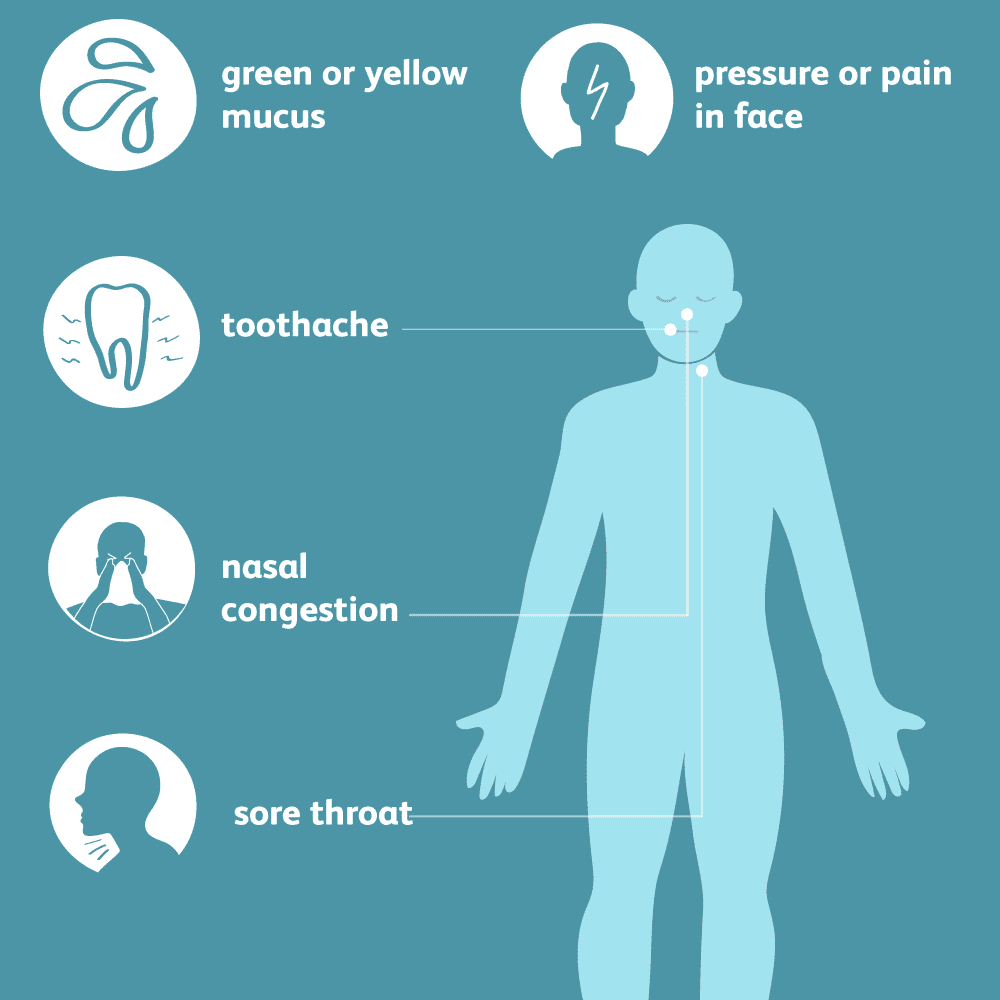When To Go To A Doctor For A Sinus Infection
An untreated sinus infection can turn into a chronic infection, so its important to see the doctor if your symptoms arent improving on their own. We recommend making an appointment with your doctor if:
- Your symptoms havent improved after two days of at-home treatment
- You have cold symptoms that last for 10 days
- You have a fever of 101 degrees Fahrenheit or higher
- Youre experiencing severe pain in the upper part of your face or your teeth
- You have facial pain from the bridge of your nose to your lower eyelid
- You notice thick and discolored mucus
- You have mild face pain for a month or longer
When Sinusitis Or Bronchitis Strike After A Cold
Sinus infections and bronchitis both frequently accompany or follow a viral cold and involve inflammation of tissues and a high production of mucus. And all of that extra mucus has to go somewhere.
In the case of sinusitis, mucus often drains down the back of the throat leading to the dreaded symptom of post-nasal drip which can also make your throat sore and cause a persistent cough.
If you develop bronchitis, mucus collects in swollen bronchial tubes which makes you cough — a lot.
Symptoms commonly associated with bronchitis
- Cough that lasts 1-3 weeks
- Recent cold symptoms such as headache, nasal congestion or sore throat
- Mild shortness of breath or wheezing
Medications And Specialist Treatment
Over-the-counter pain medications can help relieve the pain of a headache or pressure from swelling. These include ibuprofen or acetaminophen . Nasal sprays with corticosteroids also help with inflammation. OTC sprays include fluticasone and mometasone . Nasal sprays can also help make nasal polyps get smaller. This will help you breathe better if theyâre blocking your nasal passages.
If your sinusitis is caused by an infection, your doctor may prescribe an antibiotic to treat the infection and relieve some of your symptoms. Chronic sinusitis isnât often caused by an infection, but serious infections that result in sinusitis may require antibiotic treatment to prevent complications.
If your chronic sinusitis is caused by allergies, your doctor may refer you to an allergist. An allergist can conduct tests to figure out what youâre allergic to. They can then give you regular allergy shots to gradually allow your body to become immune to those allergens. Allergy shots may not take effect until several years after beginning the treatment, but they can help relieve allergy symptoms drastically in the long term.
Read Also: Advil Cold And Sinus Rite Aid
Antibiotics And Sinus Infections
When a sinus infection hits, it seems worse than what you remembered from the last time you had one. This may give you the idea that you need antibiotics, but most clear up without them. Antibiotics have no effect on viruses and aren’t recommended within the first week of developing a cold. About 70% of sinus infections go away within two weeks without antibiotics.
Consider these other forms of treatments instead of antibiotics:
- These medications are available for over-the-counter purchase. Be careful to only take these medications for a few days at most, as they can cause the return of more severe congestions.
- Over-the-counter pain relievers Aspirins, acetaminophen or ibuprofen can help relieve temporary pain.
- Saline nasal spray This is used to spray into your nose several times a day to rinse your nasal passages. It can help to prevent and treat inflammation.
Antibiotics only will be needed if the infection is severe, recurrent or persistent.
The likelihood of bacterial infection increases when:
- Symptoms last seven days or more, particularly when symptoms initially improve and then worsen.
- Mucus is thick and yellow or green in color.
- There is facial or sinus tenderness, particularly if it’s worse on one side of the face.
- Pain is present in the upper teeth and is worse on one side of the face.
If the infection becomes severe, recurrent or persistent, contact your provider.
Should You Visit A Specialist

If your sinus infection just wont go away or keeps coming back, it may be time to see an ear, nose, and throat specialist. An ENT treats conditions of the ear, nose, throat, head, face, and neck. It may be time to see an ENT if:
- Youve completed several courses of antibiotics without success
- Your doctor suspects nasal polyps or another blockage of the nasal cavity
- You have chronic sinusitis that lasts longer than 12 weeks
Living with a sinus infection is miserable and living with a sinus infection for weeks on end is worse. Contact your doctor or an ENT to get the treatment you need.
Recommended Reading: How To Knock Out A Sinus Infection Quick
Can Sinus Infections Or Sinusitis Be Prevented
Currently, there are no vaccines designed specifically against infectious sinusitis or sinus infections. However, there are vaccines against viruses and bacteria that may cause some infectious sinusitis. Vaccination against pathogens known to cause infectious sinusitis may indirectly reduce or prevent the chance of getting the disease however, no specific studies support this assumption. Fungal vaccines against sinusitis are not available, currently.
If you are prone to recurrent bouts of a yearly sinus infection it may be important to consider allergy testing to see if this is the underlying cause of the recurring problem. Treatment of the allergy may prevent secondary bacterial sinus infections. In addition, sinus infections may be due to other problems such as nasal polyps, tumors, or diseases that obstruct normal mucus flow. Treatment of these underlying causes may prevent recurrent sinus infections.
S On How To Flush Your Dogs Sinuses
Step 1: Gently take your dogs muzzle and tilt their head back.
Step 2: Drip the saline into your dogs nostrils. Never forcibly squirt the solution up their nose.
Step 3: Allow your dog to swallow, demonstrating that the saline ran into the correct location.
Step 4: After a few swallows, switch to the other nostril.
Step 5: Reward your pooch for a job well done!
Need a visual aid? Check out this video that shows how to flush your dogs sinuses at home.
Don’t Miss: Can You Beat A Sinus Infection Without Antibiotics
Why The Heck Won’t Your Sinus Infection Go Away
Plus, how to deal with the pain and congestion.
Along with shivering nonstop and skin that cant seem to stop cracking, winter is the season for getting sick. Yep, if everyone around you is hacking and sneezing away, youre not alone. And one seriously annoying issue you might experience this time of year is a sinus infection. Hello, pain above and below your eyes, relentless headaches, congestion, and greenish-yellow nasal discharge.
The good news is that with treatment, a sinus infection should start improving in about 48 to 72 hours and should be cleared in about seven to 10 days, if not sooner, says Roheen Raithatha, M.D., an ear, nose, and throat specialist. However, without treatment, a sinus infection can last multiple weeks and sometimes even a few months.
Months? Yikes.
More From Women’s Health
So whats the deal? Most sinus infections start as a viral upper respiratory infection. And some of us are more prone to getting them than others, making sinus issues more frequent and harder to treat. Whos most at risk: those with allergies that cause nasal swelling, a deviated septum, or an underlying weak immune system.
To keep yourself protected, make sure youre washing your hands a ton and always covering your mouth when you cough to avoid the germs that cause these viral infectionsbecause the bad news is, they cant be treated with antibiotics like a bacterial infection can.
Check If You Have Sinusitis
Sinusitis is common after a cold or flu.
Symptoms of sinusitis include:
- pain, swelling and tenderness around your cheeks, eyes or forehead
- a reduced sense of smell
- green or yellow mucus from your nose
- a sinus headache
Signs of sinusitis in young children may also include irritability, difficulty feeding, and breathing through their mouth.
The sinuses are small, empty spaces behind your cheekbones and forehead that connect to the inside of the nose.
Sinusitis causes the lining of the sinuses to swell up.
This stops mucus draining into your nose and throat properly, making you feel blocked up.
Recommended Reading: What Is Best For Sinus Pain
How Should I Treat My Sinus Infection
A mild, one-time infection should be handled much differently than a sinus infection that wonât go away or keeps coming back. But, even mild infections can become more serious as time goes on, and for the best results, they should be monitored and treated by an ENT. A minor sinus infection treatment may consist of:
- At home remedies: Many are searching for ânatural cures for sinus infectionâ. At home remedies are often not successful at getting to the root of the problem, but they may be helpful in easing the severity of your symptoms. Sufferers have found that warm compresses and humidifiers are very helpful.
- Antibiotics: Sinus infection antibiotics can only be successful when patients are suffering with a bacterial infection. In order to understand what kind of infection you may have, it is important to contact your ENT so they can prescribe you antibiotics when appropriate.
- Sinus Medication: Sinus infection medication may consist of nasal sprays, decongestants, and more. They are helpful to ease the symptoms but are not a long-term solution to chronic sinusitis.
For more severe infections, or chronic sinusitis, many sufferers have tried at home remedies, antibiotics and infection medications with no luck. When this is the case, patients may have to turn to more permanent solutions:
What Happens If A Sinus Infection Is Left Untreated
For some lucky people, sinus infections may go away if left untreated. Rest and hydration will certainly help with this.
For others, however, sinusitis wont go away until you seek treatment. If this is the case, a sinus infection left untreated may cause further complications .
When sinusitis spreads to areas around the eyes, you may experience redness and swelling, which can reduce vision. The most severe form of sinusitis reaching the eye is called cavernous sinus thrombosis and can actually cause blindness. It is treated by antibiotics and drainage of sinus fluids.
Sinusitis that reaches the brain may cause meningitis and brain abscesses.
You May Like: Best Antihistamine For Sinus Congestion
Birth Of A Sinus Infection
Most people dont give much thought to their sinuses. Yet these little air-filled facial chambers have an important job to do. When you breathe through your nose, your sinuses go to work filtering pollutants, allergens and other irritants. If your sinus cavities are swollen and inflamed due to a cold, mucus can become trapped and create a breeding ground for infection.
Common Symptoms Of A Bacterial Sinus Infection

- Same symptoms of a viral sinus infection
- Symptoms start to worsen after 7-10 days
- Fever that lasts multiple days in a row
- Typically requires antibiotics
So, lets go back to the original question: Can you have a sinus infection without a fever? As you can now see, having or not having a fever wont always help you determine if you have a sinus infection.
However, one thing that you can say with more certainty is that you probably have a bacterial sinus infection if you have a fever that lasts multiple days and does not let up.
Dont Miss: Causes Of Constant Sinus Drainage
You May Like: What Is The Best Allergy Medicine For Sinus Headache
Sinus Infection Home Remedy
Treatment For Sinusitis From A Gp
If you have sinusitis, a GP may be able to recommend other medicines to help with your symptoms, such as:
- steroid nasal sprays or drops â to reduce the swelling in your sinuses
- antihistamines â if an allergy is causing your symptoms
- antibiotics â if a bacterial infection is causing your symptoms and youre very unwell or at risk of complications
You might need to take steroid nasal sprays or drops for a few months. They sometimes cause irritation, sore throats or nosebleeds.
A GP may refer you to an ear, nose and throat specialist if, for example, you:
- still have sinusitis after 3 months of treatment
- keep getting sinusitis
- only have symptoms on 1 side of your face
They may also recommend surgery in some cases.
You May Like: Heat Or Cold For Sinus Infection
Sinusitis Wont Go Away Consider Balloon Sinuplasty
Whether this is your first bout with sinusitis that wont go away or you experience sinus infections on a regular basis, you should know that getting rid of sinusitis is well within reach.
At Sinus Solutions of South Florida, Dr. Napoleon G. Bequer has provided hundreds of patients with relief from chronic sinusitis using the balloon sinuplasty procedure. So if you have sinusitis that wont go away, contact us online, call us at 561-790-7744, or take our sinus quiz today to see if youre a viable candidate for balloon sinuplasty.
Related Resources:
How Do Sinus Infections Start
Sinusitis occurs when the lining of the sinus or nasal cavity becomes inflamed. What can start as inflammation in your sinuses from a respiratory infection, allergies or environmental pollutants can spark a sinus infection when the lining of the sinuses becomes inflamed and swollen, causing mucus to become trapped and germs to grow.
“Once you have a cold or upper respiratory tract infection, that virus can then settle into the sinuses and cause inflammation as well,” said Dr. Mas Takashima, an otolaryngologist and chair of Houston Methodist ENT Specialists. “About 95% of sinusitis is caused by a virus making it much more common than bacterial sinusitis. Viral sinusitis is also much more infectious as well.”
Certain conditions, such as having allergies, asthma or a respiratory infection, can make people more susceptible to getting chronic sinus infections, and it is important that these patients be evaluated to address the cause and not just the sinusitis symptoms.
“There are many causes of chronic sinusitis. “Patients with a weakened immune system are more prone to getting recurrent acute sinusitis,” explains Dr. Takashima. “Sometimes, however, the issue may be anatomy, such as a deviated septum , scarring from previous sinus surgery, or nasal polyps, which result from chronic inflammation in the nose. Once the polyps get to a certain size, they rarely regress on their own and they narrow the sinus drainage pathways.”
Don’t Miss: What Is The Best Nighttime Sinus Medicine
How An Ent Treats A Sinus Infection
If you have a lingering sinus infection after antibiotics, an ENT doctor often elects to be more aggressive in treatment than a primary care physician. They may prescribe longer courses of antibiotics, stronger medications, or recommend a procedure to open the sinuses.
If you have persistent sinus problems, the sinuses must first be unblocked. Sometimes, thats done through a simple balloon sinuplasty and irrigation. Other times, unblocking the sinuses requires a more aggressive procedure like endoscopic sinus surgery. We opt for this procedure when the sinuses become so blocked, tissue and bone need to be removed to create a wider opening.
If youre dealing with a lingering sinus infection, dont let it progress to a more serious issue. Call your ENT so they can discover whats at the root of your problem and find a treatment to bring you relief.
When To Seek Medical Care
See a doctor if you have:
- Severe symptoms, such as severe headache or facial pain.
- Symptoms that get worse after improving.
- Symptoms lasting more than 10 days without getting better.
- Fever longer than 3-4 days.
You should also seek medical care if you have had multiple sinus infections in the past year.
This list is not all-inclusive. Please see a doctor for any symptom that is severe or concerning.
Other conditions can cause symptoms similar to a sinus infection, including:
- Seasonal allergies
Also Check: What Do Sinus Polyps Feel Like
Why Sinusitis Keeps Coming Back
Sinus infections can be incredibly painful, and they can become debilitating if when they are not diagnosed and treated properly. The relief of a cured sinus infection quickly evaporates when the telltale symptoms of an infection return and patients are left wondering why sinusitis wont stay away. In addition to causing discomfort and/or missed days of work, untreated and recurrent sinus infections can lead to more permanent damage in the sinus cavities and nasal passages.
While the very occasional, acute sinus infection is relatively normal, recurrent or chronic sinus infections are not. If a sinus infection returns again after youve finished a round of antibiotics and/or have followed your physicians at-home treatment instructions to the letter, please schedule another appointment ASAP.
You may need a referral to an ENT specialist to determine why the sinus infection continues to come back, and whether anatomical corrections may be necessary to fix the problem once and for all.
How Is A Sinus Infection Diagnosed And Treated

Your doctor will give you a physical exam and take your medical history. You might get a CT scan of your sinuses.
Your doctor may prescribe medication. They may recommend antibiotics if your symptoms go on for more than 10 days. , antihistamines, and other drugs help lessen the swelling in your sinuses and nasal passages.
Steam and hot showers can help you loosen mucus. Your doctor may also suggest nasal saline to wash mucus from your nose.
In rare cases, when a sinus infection doesn’t go away, long-term antibiotics or surgery may be needed.
Don’t Miss: Sinus Infection How To Treat At Home